Monday, December 11th 2017

NVIDIA's Latest Titan V GPU Benchmarked, Shows Impressive Performance
NVIDIA pulled a rabbit out of its proverbial hat late last week, with the surprise announcement of the gaming-worthy Volta-based Titan V graphics card. The Titan V is another one in a flurry of Titan cards from NVIDIA as of late, and while the healthiness of NVIDIA's nomenclature scheme can be put to the sword, the Titan V's performance really can't.
In the Unigine Superposition benchmark, the $3000 Titan V managed to deliver 5,222 points in the 8K Optimized preset, and 9,431 points on the 1080p Extreme preset. Compare that to an extremely overclocked GTX 1080 Ti running at 2,581 MHz under liquid nitrogen, which hit 8,642 points in the 1080p Extreme preset, and the raw power of NVIDIA's Volta hardware is easily identified. An average 126 FPS is also delivered by the Titan V in the Unigine Heaven benchmark, at 1440p as well. Under gaming workloads, the Titan V is reported to achieve from between 26% and 87% improvements in raw performance, which isn't too shabby, now is it?Poring through a Reddit discussion on the Titan V's prowess, the amount of benchmarks already in the wild is overwhelming, but a clear picture is easy to get: the Titan V is the world's most powerful gaming card at the moment, delivering a better experience in every setting, game, and workload (be it VR gaming or rendering) than any other GPU.
In Futuremark's VR Mark "Blue Room" benchmark, for instance, the Titan V easily delivers a score of 4,400 points - compared to the benchmark's own base premium high-end PC scores, that's a 1,428 points increase, delivering an above 90 FPS experience, something a GTX 1080 Ti wouldn't be able to achieve under the same settings. On the TimeSpy benchmark, the stock Titan V delivers 11,539 points, around 1,000 points more than the average 10,500 points a GTX 1080 Ti would achieve, paired with the same processor (there are higher 1080 Ti scores, yes; there are also lower.)The Titan V achieves an average of 65 FPS on max settings at 1440p; an average of 157 FPS on Gears of War 4 on Ultra settings at the same resolution; 76 FPS Average on 1440p, Crazy Preset of the Ashes of The Singularity Benchmark; and a slew of other gaming results that you'd do better in poring through yourself, including Deus Ex: mankind Divided, Fallout 4, XCOM 2, and others.We also have to remember that the Titan V can either be seen as the most expensive gaming graphics card that NVIDIA has ever sold, or as the best price/performance Volta-based computing graphics card. In general compute workloads the Titan V shines again, eking out victory after victory against NVIDIA's other gaming-capable offerings such as the GTX 1080 Ti. This is by no means an extensive coverage, but the Titan V has been benchmarked as delivering 41 seconds GPU time in the V-Ray benchmark, against the 107 seconds that a GTX 1080 Ti managed to deliver (with an equivalent CPU score). On SpecViewPerf 12.1, the Titan V delivers better performance than NVIDIA's professional Quadro P6000 (which goes for $5,000) across all workloads save one. This seems to be the best price-performance ratio for this graphics card, not gaming; so if you're looking for the best possible compute performance and the best gaming experience on the side, the Titan Volta is the only solution.
Sources:
Reddit User @hellotanjent, Joker Productions YouTube, Reddit User @Nekrosmas
In the Unigine Superposition benchmark, the $3000 Titan V managed to deliver 5,222 points in the 8K Optimized preset, and 9,431 points on the 1080p Extreme preset. Compare that to an extremely overclocked GTX 1080 Ti running at 2,581 MHz under liquid nitrogen, which hit 8,642 points in the 1080p Extreme preset, and the raw power of NVIDIA's Volta hardware is easily identified. An average 126 FPS is also delivered by the Titan V in the Unigine Heaven benchmark, at 1440p as well. Under gaming workloads, the Titan V is reported to achieve from between 26% and 87% improvements in raw performance, which isn't too shabby, now is it?Poring through a Reddit discussion on the Titan V's prowess, the amount of benchmarks already in the wild is overwhelming, but a clear picture is easy to get: the Titan V is the world's most powerful gaming card at the moment, delivering a better experience in every setting, game, and workload (be it VR gaming or rendering) than any other GPU.
In Futuremark's VR Mark "Blue Room" benchmark, for instance, the Titan V easily delivers a score of 4,400 points - compared to the benchmark's own base premium high-end PC scores, that's a 1,428 points increase, delivering an above 90 FPS experience, something a GTX 1080 Ti wouldn't be able to achieve under the same settings. On the TimeSpy benchmark, the stock Titan V delivers 11,539 points, around 1,000 points more than the average 10,500 points a GTX 1080 Ti would achieve, paired with the same processor (there are higher 1080 Ti scores, yes; there are also lower.)The Titan V achieves an average of 65 FPS on max settings at 1440p; an average of 157 FPS on Gears of War 4 on Ultra settings at the same resolution; 76 FPS Average on 1440p, Crazy Preset of the Ashes of The Singularity Benchmark; and a slew of other gaming results that you'd do better in poring through yourself, including Deus Ex: mankind Divided, Fallout 4, XCOM 2, and others.We also have to remember that the Titan V can either be seen as the most expensive gaming graphics card that NVIDIA has ever sold, or as the best price/performance Volta-based computing graphics card. In general compute workloads the Titan V shines again, eking out victory after victory against NVIDIA's other gaming-capable offerings such as the GTX 1080 Ti. This is by no means an extensive coverage, but the Titan V has been benchmarked as delivering 41 seconds GPU time in the V-Ray benchmark, against the 107 seconds that a GTX 1080 Ti managed to deliver (with an equivalent CPU score). On SpecViewPerf 12.1, the Titan V delivers better performance than NVIDIA's professional Quadro P6000 (which goes for $5,000) across all workloads save one. This seems to be the best price-performance ratio for this graphics card, not gaming; so if you're looking for the best possible compute performance and the best gaming experience on the side, the Titan Volta is the only solution.
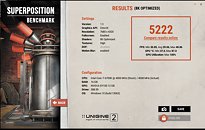
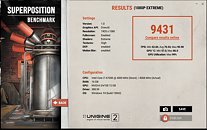
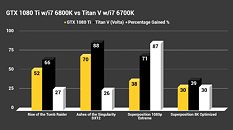
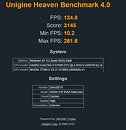





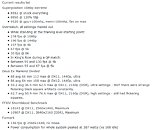
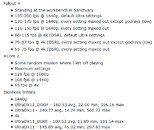

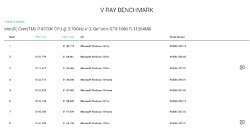
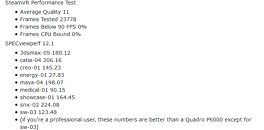
71 Comments on NVIDIA's Latest Titan V GPU Benchmarked, Shows Impressive Performance
PS
Why is it compared to 1080Ti and not Titan X (Pascal)?45% eh?
And where it is faster, this lovely drop in min frame rate over STOCK Titan Pascal:
It isn't even "no compromise better product" let alone that it is more that 2 times more expensive.
Even GN could not twist it enough.
But, Titan V is a no compromise product... only not (primarily) for gaming. Fully unlocked, all the FP16, FP64, Tensor cores - this is a real compute monster.
Honestly, I am somewhat surprised about how well it does in games, I would have expected a larger performance hit for extra logic in the GPU that is largely if not completely useless for games.
www.3dmark.com/compare/spy/2920134/spy/2920319
Does OK on Luxmark 3 too:
www.hardwareluxx.de/index.php/artikel/hardware/grafikkarten/45199-nvidia-titan-v-volta-architektur-im-gaming-test.html?start=6
I double dog dare ye to beat this one.
Overclocking is one thing.
Omegaclocking is quite another.
Strangely, system does Gray Screen of You Have to Turn the Power off at the Power Supply Death if I try it on Extreme.
I'm betting he's willing to lash out at Mercedes also because a Maybach isn't twice as fast as an S Classe, despite being at least twice as expensive. I mean, seriously, I can't think of a single line of products where the top end costs proportionally more than mainstream. And Titans are barely worthy of the "line of products" designation, they're basically a no show in any video card statistic, that's how low their numbers are.
I wanne kawasaki insted, he give realy speed so mutch bether
Like the past two generation of Titans (gaming cards with more VRAM)
A gaming card
Referred to as a GeForce card by Nvidia themselves
What Volta Titan is:
A GPU with Tensor Cores that makes it great for AI and some other work applications
A cheaper alternative to A $10,000 Tesla card though a bit inferior
We may get something for gaming out of Volta but the Titan is not it. Most likely Nvidia will strip the Tensor Cores out and bring a gaming GPU and probably call it Ampere.
You could argue that a different suite of tests would have been more relevant, but as far as offering a first peek into Volta, I believe TPU did a great job.